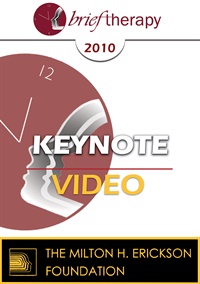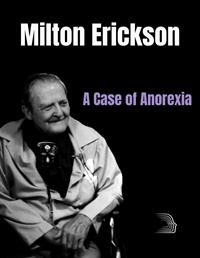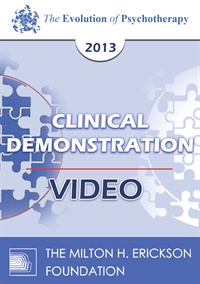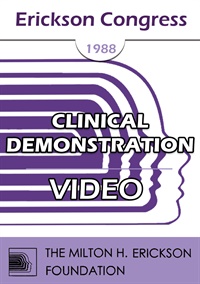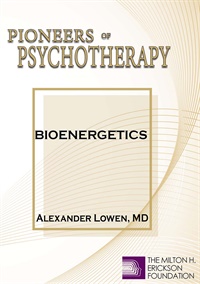
- Average Rating:
- Not yet rated
- Topic Areas:
- Clinical Demonstrations | Bioenergetics | Eating Disorders | Aging and Mortality | Psychotherapy | Abuse | Mind-Body
- Bundle(s):
- Pioneers of Psychotherapy Bundle
- Categories:
- Pioneers of Psychotherapy | Evolution of Psychotherapy | Evolution of Psychotherapy 2000
- Faculty:
- Alexander Lowen, MD
- Course Levels:
- Master Degree or Higher in Health-Related Field
- Duration:
- 00:59:00
- Format:
- Audio and Video
- Original Program Date:
- May 27, 2000
- Short Description:
- Alexander Lowen (2000) demonstrates with Ann, who he used as a ten years earlier. She reports that since that first session she has been free of severe asthma attacks. She is now troubled by the death of her father and mother, abuse from her brother, excessive weight gain and the onset of menopause. Lowen guides her through a series of movement exercises.
- Price:
- $59.00 - Base Price
- Average Rating:
- Not yet rated
- Topic Areas:
- Clinical Demonstrations | Cognitive Behavior Therapy (CBT) | Eating Disorders | Weight Loss
- Categories:
- Brief Therapy Conference | Brief Therapy Conference 2008
- Faculty:
- Judith Beck, PhD
- Course Levels:
- Master Degree or Higher in Health-Related Field
- Duration:
- 56:42
- Format:
- Audio and Video
- Original Program Date:
- Dec 13, 2008
- Short Description:
- A detailed, practical look at using cognitive behavioral strategies to support weight loss and long-term maintenance. Participants observe how clear structure, skill-building, and moment-to-moment coaching help clients manage cravings, reduce unplanned eating, and shift long-standing patterns around food, guilt, and self-control. The session shows how tools like daily motivation practice, planned flexibility, and “no choice” thinking can strengthen follow-through and help clients build a sustainable relationship with eating rather than cycling through diets.
- Price:
-
Sale is $29.00
price reduced from Base Price - $59.00
- Average Rating:
- Not yet rated
- Topic Areas:
- Psychotherapy | Keynotes | Eating Disorders
- Categories:
- Brief Therapy Conference | Brief Therapy Conference 2010
- Faculty:
- Thomas Szasz, MD
- Course Levels:
- Master Degree or Higher in Health-Related Field
- Duration:
- 1:28:23
- Format:
- Audio and Video
- Original Program Date:
- Dec 11, 2010
- Short Description:
- Millions of Americans are overweight or obese. Medication and psychotherapy may result in modest weight loss but nearly all regain weight within five years. The missing ingredient for successful treatment is cognition. To make permanent changes in their eating behavior, and thus their weight, individuals must learn how to change their dysfunctional ideas about food, eating, other people, and themselves and learn how to cope with a sense of unfairness, deprivation, disappointment, and discouragement. Cognitive behavioral approaches have been demonstrated to be effective for this problem.
- Price:
-
Sale is $29.00
price reduced from Base Price - $59.00
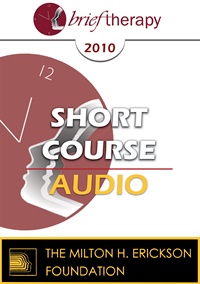
- Average Rating:
- Not yet rated
- Topic Areas:
- Children and Adolescent Therapy | Short Courses | Eating Disorders | Anorexia | Brief Therapy
- Categories:
- Brief Therapy Conference | Brief Therapy Conference 2010
- Faculty:
- Christine Silverstein
- Duration:
- 1:28:27
- Format:
- Audio Only
- Original Program Date:
- Dec 09, 2010
- Short Description:
- For centuries, clinicians have been baffled as to how to achieve healthy outcomes in the treatment of anorexia nervosa. In this workshop, the presenter will describe how she assisted a nine-year-old female soccer player, who experienced disordered eating. The techniques used to facilitate performance, such as goal-setting, mental rehearsal, and positive selftalk, will be explained, as well as unique approaches with Ericksonian hypnosis and imagery. The use of puppetry, which was an adjunct to Parts Therapy, will be demonstrated. With Christine Silverstein.
- Price:
- $15.00 - Base Price
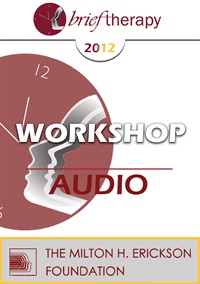
- Average Rating:
- Not yet rated
- Topic Areas:
- Hypnosis | Workshops | Anorexia | Eating Disorders | Brief Therapy
- Categories:
- Brief Therapy Conference | Brief Therapy Conference 2012
- Faculty:
- Camillo Loriedo, MD, PhD
- Duration:
- 2:46:47
- Format:
- Audio Only
- Original Program Date:
- Dec 08, 2012
- Short Description:
- BT12 Workshop 33 – Brief Therapy for the Treatment of Anorexia – Camillo Loriedo, MD, PhD Anorexia and Bulimia Nervosa will be presented in the frame of the Extreme Polarities Theory, and examine why, in some families, eating disorders develop and there is continuity among opposite forms of disturbances. Principles of intervention, as well as specific techniques will be presented, including the clinical applications (and advantages) of direct and indirect hypnosis.
- Price:
- $15.00 - Base Price
Tags: Anorexia Brief Therapy
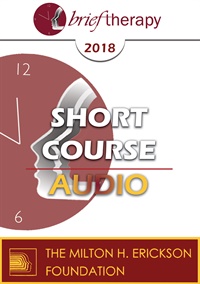
- Average Rating:
- Not yet rated
- Topic Areas:
- Short Courses | Depression | Eating Disorders | Brief Therapy | Hypnotherapy | Weight Loss
- Categories:
- Brief Therapy Conference | Brief Therapy Conference 2018
- Faculty:
- Margot Gotte-El Fartoukh, Dr. phil
- Duration:
- 1:26:23
- Format:
- Audio Only
- Original Program Date:
- Dec 06, 2018
- Short Description:
- The control of body weight is largely remote instinctively. When conscious efforts go nowhere, hypnotherapeutic strategies can open new possibilities. Presented is a model of hypnotherapeutic strategies of weight regulation introduced on the M.E.G. Congress 2018 in Bad Kissingen (Germany).
- Price:
- $15.00 - Base Price
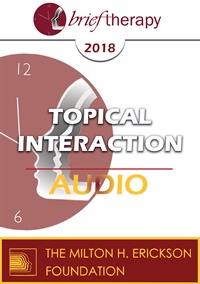
- Average Rating:
- Not yet rated
- Topic Areas:
- Topical Interactions | Anorexia | Eating Disorders | Bulimia | Brief Therapy
- Categories:
- Brief Therapy Conference | Brief Therapy Conference 2018
- Faculty:
- Camillo Loriedo, MD, PhD
- Duration:
- 1:00:27
- Format:
- Audio Only
- Original Program Date:
- Dec 08, 2018
- Short Description:
- Various attempts to treat these disturbances briefly have been made, but in most cases they proved to be unsuccessful due a very high relapse rate. To avoid a fearsome chronicity, a number of other factors, like alexithymia, low self-esteem, perfectionism, dissociation, dichotomous thinking, and others should be considered for treatment. Indications of how to deal with these factors in Ericksonian Brief Therapy will be offered.
- Price:
- $15.00 - Base Price
Credit available - Click Here for more information
- Average Rating:
- Not yet rated
- Topic Areas:
- Anorexia | Eating Disorders | Milton Erickson | Ericksonian Hypnosis and Therapy Techniques | Utilization | Hypnosis
- Categories:
- Erickson Materials | Erickson Streaming Video Collection | Milton H. Erickson Collections | Online Continuing Education
- Faculty:
- Milton H. Erickson, MD | Jeffrey Zeig, PhD
- Course Levels:
- Master Degree or Higher in Health-Related Field
- Duration:
- 1 hour
- Format:
- Audio and Video
- Original Program Date:
- Apr 27, 2020
- Short Description:
- In this video, you will see Erickson’s unusual way of treating anorexia. Erickson described himself as a person who has an iron fist, but a velvet glove. He knew when it was right to be firm, to be disciplined, and even to be assertive in work with a client. Dr. Jeffrey Zeig provides insightful commentary on this historic Erickson clip.
- Price:
- $29.95 - Base Price
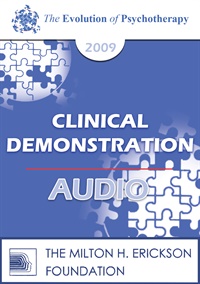
- Average Rating:
- Not yet rated
- Topic Areas:
- Clinical Demonstrations | Cognitive Behavior Therapy (CBT) | Eating Disorders | Psychotherapy | Weight Loss
- Categories:
- Evolution of Psychotherapy | Evolution of Psychotherapy 2009
- Faculty:
- Judith Beck, PhD
- Duration:
- 56 Minutes
- Format:
- Audio Only
- Original Program Date:
- Dec 11, 2009
- Short Description:
- Help clients build sustainable weight loss skills. Participants observe how motivation, hunger tolerance, craving management, and long-term thinking are addressed through practical tools like response cards, structured eating, and daily self-talk. The session offers a clear, compassionate look at why weight regain happens and how cognitive and behavioral strategies can support lasting change rather than repeated cycles of dieting.
- Price:
- $15.00 - Base Price
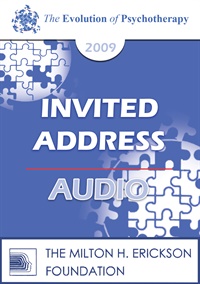
- Average Rating:
- Not yet rated
- Topic Areas:
- Invited Addresses | Eating Disorders | Psychotherapy | Weight Loss | Cognitive Behavior Therapy (CBT)
- Categories:
- Evolution of Psychotherapy | Evolution of Psychotherapy 2009
- Faculty:
- Judith Beck, PhD
- Duration:
- 58 Minutes
- Format:
- Audio Only
- Original Program Date:
- Dec 11, 2009
- Short Description:
- A comprehensive, clinically grounded look at cognitive therapy for overweight and obesity. Participants learn how thoughts, expectations, and daily habits drive eating behavior, and how tools like coping cards, planned eating, and cognitive restructuring support sustainable weight loss and maintenance. The session integrates research, real-world clinical strategies, and practical examples, showing how cognitive therapy moves beyond diet advice to help people build lifelong skills for managing cravings, setbacks, and motivation.
- Price:
- $15.00 - Base Price
- Average Rating:
- Not yet rated
- Topic Areas:
- Clinical Demonstrations | Cognitive Behavior Therapy (CBT) | Eating Disorders | Psychotherapy
- Categories:
- Evolution of Psychotherapy | Evolution of Psychotherapy 2013
- Faculty:
- Judith Beck, PhD
- Course Levels:
- Master Degree or Higher in Health-Related Field
- Duration:
- 57:13
- Format:
- Audio and Video
- Original Program Date:
- Dec 13, 2013
- Short Description:
- This clinical demonstration offers a detailed look at cognitive behavioral coaching for weight loss and long-term maintenance. Viewers watch how sabotaging thoughts, cravings, emotional eating, and all-or-nothing dieting are addressed through structured thinking tools, planning, and realistic habit change. The work shows how CBT helps people build sustainable eating patterns, tolerate discomfort without giving up, and prevent relapse by changing how they think about food, motivation, and daily choices.
- Price:
-
Sale is $29.00
price reduced from Base Price - $59.00
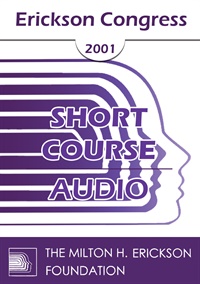
- Average Rating:
- Not yet rated
- Topic Areas:
- Short Courses | Eating Disorders | Ericksonian Hypnosis and Therapy Techniques | Psychology | Habits
- Categories:
- Erickson Congress | Erickson Congress 2001
- Faculty:
- Brian Grodner, PhD
- Duration:
- 1:25:57
- Format:
- Audio Only
- Original Program Date:
- Dec 06, 2001
- Short Description:
- IC01 Short Course 40 - Ericksonian Approaches to Weight Loss and Non-Smoking: Strategies to Enhance the "Psychology of Permanent Habit Control" - Brian Grodner, PhD
- Price:
- $15.00 - Base Price
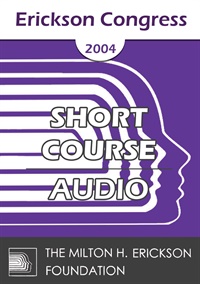
- Average Rating:
- Not yet rated
- Topic Areas:
- Short Courses | Borderline | Eating Disorders | Ericksonian Hypnosis and Therapy Techniques | Hypnosis | Personality Disorders | Addiction | Utilization
- Categories:
- Erickson Congress | Erickson Congress 2004
- Faculty:
- Ilana Oren, Ph.D., Sc.D., LMFT
- Duration:
- 1:19:45
- Format:
- Audio Only
- Original Program Date:
- Dec 02, 2004
- Short Description:
- Have you worked with the patient who one day idealized you and next devalued your skills? The Borderline, who finds refuge in food addiction. Borderline personality is an underlying character structure, marked by a fragmented sense of identity and maladaptive patterns of perceiving, behaving and relating to others. Food provides a soothing antidote to feeling of shame, betrayal and the longing for a positive mother. Ericksonian hypnosis paves the way to reach the habitually oppositional patient.
- Price:
- $15.00 - Base Price

- Average Rating:
- Not yet rated
- Topic Areas:
- Short Courses | Eating Disorders
- Categories:
- Erickson Congress | Erickson Congress 2004
- Faculty:
- Hillel Zeitlin, MSW
- Duration:
- 1:19:45
- Format:
- Audio Only
- Original Program Date:
- Dec 02, 2004
- Short Description:
- The Peaceful Eating Process is an original technique that incorporates elements of Ericksonian hypnosis, mindfulness meditation and somatic therapies to address compulsive eating. It locates the energy of compulsive eating in the mind/body expression of somatic conflicts and provides a practice by which clients can gracefully restore a sense of serenity to the arena of appetite.
- Price:
- $15.00 - Base Price
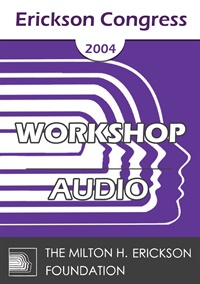
- Average Rating:
- Not yet rated
- Topic Areas:
- Workshops | Brief Therapy | Eating Disorders
- Categories:
- Erickson Congress | Erickson Congress 2004
- Faculty:
- Giorgio Nardone
- Duration:
- 1:26:05
- Format:
- Audio Only
- Original Program Date:
- Dec 05, 2004
- Short Description:
- Eating disorders are rapidly evolving towards a kind of "refined specialization." Young women with bulimic or anorexic tendencies have discovered different ways that enable them to control their weight without giving up the pleasure of eating, thus nowadays we encounter new forms of eating disorders. All these have different persisting patterns and attempted solutions. As a result, each requires a different treatment protocol.
- Price:
- $15.00 - Base Price

- Average Rating:
- Not yet rated
- Topic Areas:
- Short Courses | Eating Disorders | Hypnosis
- Categories:
- Erickson Congress | Erickson Congress 2007
- Faculty:
- Bart Walsh, MSW
- Duration:
- 1:18:51
- Format:
- Audio Only
- Original Program Date:
- Dec 07, 2007
- Short Description:
- Hypnosis lends itself nicely to certain aspects of eating disorder treatment. Eating disorders like anorexia nervosa clearly display trance phenomena. Changing or disrupting any element of an eating disorder complex may inspire beneficial shifts in other parts of the complex. This presentation illustrates several successfully applied hypnotic approaches designed to establish a reality-based body image in an eating disordered person over a relatively brief treatment sequence.
- Price:
- $15.00 - Base Price
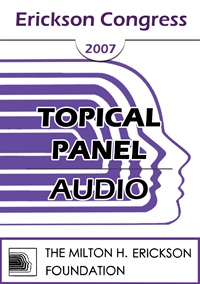
- Average Rating:
- Not yet rated
- Topic Areas:
- Topical Panels | Eating Disorders
- Categories:
- Erickson Congress | Erickson Congress 2007
- Faculty:
- Consuelo Casula, Dipl. Psych | Giorgio Nardone | Dan Short, PhD | Albina Tamalonis, PsyD
- Duration:
- 1:03:09
- Format:
- Audio Only
- Original Program Date:
- Dec 08, 2007
- Short Description:
- IC07 Topical Panel 12 - Eating Disorders - Consuelo Casula, Lic Psych, Giorgio Nardone, Ph.D., Dan Short, PhD, Albina Tamalonis, Psy.D.
- Price:
- $15.00 - Base Price
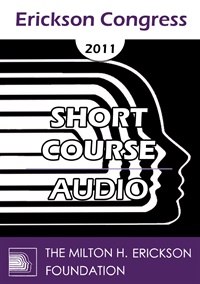
- Average Rating:
- Not yet rated
- Topic Areas:
- Short Courses | Unconscious Processes | Eating Disorders | Communication | Anorexia | Bulimia
- Categories:
- Erickson Congress | Erickson Congress 2011
- Faculty:
- Bart Walsh, MSW
- Duration:
- 1:28:11
- Format:
- Audio Only
- Original Program Date:
- Dec 09, 2011
- Short Description:
- Rapid remission of anorexia, bulimia and binge eating disorder results from this new approach. A form of unconscious communication known as ideomotor questioning is employed. Experiential exercises introduce participants to this communication style which allows safe access to psychobiological information. Clients are given instructions allowing them to maintain full management of this chronic illness on their own.
- Price:
- $15.00 - Base Price

- Average Rating:
- Not yet rated
- Topic Areas:
- Addiction | Short Courses | Borderline | Eating Disorders | Ericksonian Hypnosis and Therapy Techniques | Personality Disorders
- Categories:
- Erickson Congress | Erickson Congress 2011
- Faculty:
- Ilana Oren, Ph.D., Sc.D., LMFT
- Duration:
- 1:22:05
- Format:
- Audio Only
- Original Program Date:
- Dec 09, 2011
- Short Description:
- Have you worked with a patient who one day idealized you and the other devalued your skills? The Borderline, who finds refuge in Food Addiction. Borderline personality is an underlying character structure, marked by a fragmented sense of identity and maladaptive patterns of perceiving, behaving and relating to others. Food provides a soothing antidote to feelings of shame, betrayal and the longing for a positive mother. Brief Ericksonian Solutions paved the way to reach the habitually oppositional patient who is addicted to carbohydrates.
- Price:
- $15.00 - Base Price
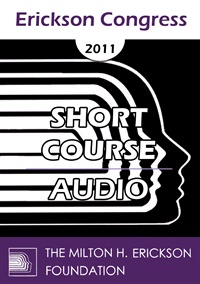
- Average Rating:
- Not yet rated
- Topic Areas:
- Short Courses | Eating Disorders | Ericksonian Hypnosis and Therapy Techniques | Interviewing | Metaphors | Utilization | Weight Loss | Humor
- Categories:
- Erickson Congress | Erickson Congress 2011
- Faculty:
- Stu Belskus, MSW
- Duration:
- 51:09
- Format:
- Audio Only
- Original Program Date:
- Dec 09, 2011
- Short Description:
- This workshop explores Ericksonian approaches to weight loss, including paradox, metaphor, utilization, humor and possibilities. Motivational Interviewing will be utilized. The metaphor of weight loss as a journey is central. Departure, initiation and return are highlighted, noting obstacles and struggles encountered during this exciting adventure! A transformational journey representing a higher level of conscious-ness with increased meaning that makes change possible will be presented.
- Price:
- $15.00 - Base Price
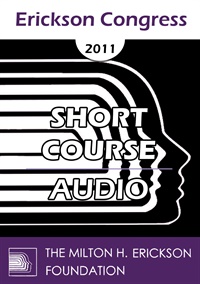
- Average Rating:
- Not yet rated
- Topic Areas:
- Short Courses | Hypnosis | Mind-Body | Hypnotherapy | Anxiety | Depression | Eating Disorders
- Categories:
- Erickson Congress | Erickson Congress 2011
- Faculty:
- Brigitta Loretan-Meier, MS
- Duration:
- 1:33:20
- Format:
- Audio Only
- Original Program Date:
- Dec 09, 2011
- Short Description:
- Irritable Bowel Syndrome (IBS) is one of the most common gastrointestinal disorders. This presentation explains an interdisciplinary approach to dealing with serious problems of IBS-patients. We learn that there are multiple expectations and needs of the clients with a high level of dysfunctional symptoms, as well as multiple stress factors, anxiety and depression. How to regain a better quality of life scores? The importance of focusing the invisible, the affective part of the IBS difficulties is complicated. While setting realistic goals, a new approach leads to body self-regulation with different bodywork techniques and hypnotherapeutic strategies.
- Price:
- $15.00 - Base Price
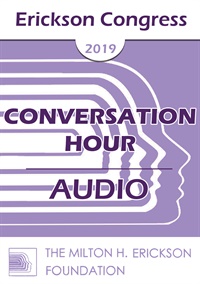
- Average Rating:
- Not yet rated
- Topic Areas:
- Conversation Hours | Eating Disorders | Ericksonian Hypnosis and Therapy Techniques | Anorexia | Family Therapy
- Categories:
- Erickson Congress | Erickson Congress 2019
- Faculty:
- Camillo Loriedo, MD, PhD
- Duration:
- 1 Hour 1 Minutes
- Format:
- Audio Only
- Original Program Date:
- Dec 14, 2019
- Short Description:
- Eating Disorders are a good example of massive interdependence among family members. Salvador Minuchin described families with Anorexia Nervosa as enmeshed families, and the interdependence it is certainly the base for enmeshment. Recent studies as well as more extended clinical experiences demonstrate that although bulimia appears to produce less reciprocal involvement, and some other form of apparent disengagement, we really can say that reciprocal interdependence in the family it always present, even if it assumes more hidden and complex forms.
- Price:
- $15.00 - Base Price

- Average Rating:
- Not yet rated
- Topic Areas:
- Workshops | Eating Disorders | Ericksonian Hypnosis and Therapy Techniques | Addiction | Hypnosis
- Categories:
- Erickson Congress | Erickson Congress 2019
- Faculty:
- Albina Tamalonis, PsyD
- Duration:
- 1 Hour 57 Minutes
- Format:
- Audio Only
- Original Program Date:
- Dec 15, 2019
- Short Description:
- During the first hour of this workshop the specific treatment ideas targeting Eating Disorders will be presented. Also, the workshop will delineate how an eating disorder is an addiction and present the underlying issues, which need to be addressed because of an addiction’s multi-dimensional infiltration. The remaining hour will be a demonstration of Ericksonian Hypnosis on a volunteer who wants to lose or gain any amount of weight. You will see: a Ericksonian diagnostic interview which focuses on the present where the solutions can be found; an Ericksonian induction using conscious/unconscious dissociation; a Ericksonian suggestion phase tailored to fit the patient; and a reorientation out of trance. There will be some time for questions and discussion.
- Price:
- $15.00 - Base Price
- Average Rating:
- Not yet rated
- Topic Areas:
- Clinical Demonstrations | Brief Therapy | Eating Disorders
- Categories:
- Erickson Congress | Erickson Congress 1988
- Faculty:
- Carol Lankton, MA
- Course Levels:
- Master Degree or Higher in Health-Related Field
- Duration:
- 57:05
- Format:
- Audio and Video
- Original Program Date:
- Dec 09, 1988
- Short Description:
- IC88 Clinical Demonstration 05 - Short Approaches to Heavy Problems: Brief Therapy for Weight Reduction - Carol Lankton, M.A.
- Price:
- $29.00 - Base Price
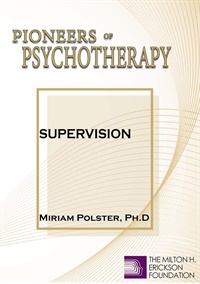
- Average Rating:
- Not yet rated
- Topic Areas:
- Clinical Demonstrations | Eating Disorders | Gestalt | Suicide | Psychotherapy | Supervision
- Bundle(s):
- Women Pioneers of Psychotherapy | Pioneers of Psychotherapy Bundle
- Categories:
- Pioneers of Psychotherapy | Evolution of Psychotherapy | Evolution of Psychotherapy 2000
- Faculty:
- Miriam Polster
- Course Levels:
- Master Degree or Higher in Health-Related Field
- Duration:
- 01:01:00
- Format:
- Audio and Video
- Original Program Date:
- May 26, 2000
- Short Description:
- Miriam Polster (2000) demonstrates supervision with Wendy, a clinical social worker who conducts therapy in the home. Polster’s supervision focuses on finding Wendy’s unique gifts and how these can be integrated into therapy. Next, Steve is working with a woman who has a history of bulimia and has threatened suicide. Polster follows this demonstration by explaining her work.
- Price:
-
Nate Sub 1.1 Price is $0.00
price reduced from Base Price - $59.00



